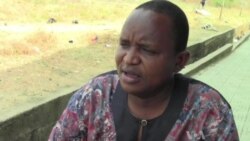ABUJA —
From the volatile oil-producing Niger Delta to northern forests where insurgents terrorize villagers, some Nigerians blame corruption for many of their woes, but no one knows how to stop it.
About half of all Nigerians are without electricity. Without a generator, no one, not even the richest Nigerians, has electricity all day.
At the University of Abuja, where the power is off, political scientist Abubakar Umar Kari blames corruption for the outage, along with a host of other problems.
“As far as we are concerned, corruption is the biggest industry in Nigeria," Kari said. "The Nigerian elite have perfected the act at not only perpetrating corruption but ensuring that they use the instrumentality of corruption as statecraft.”
Early this month, Central Bank Governor Lamido Sanusi was suspended and placed under investigation after saying Nigeria’s national oil company had not accounted for $20 billion.
Others who have exposed large-scale corruption in Nigeria, such as Nuru Ribadu, a former anti-corruption chief who accused officials of stealing $380 billion and, more recently, Nigerian legislator Farouk Lawan, who spearheaded a report about a $6.8 billion fuel subsidy scam, have been ousted and accused of taking bribes.
Kari said corruption is at least partly to blame for widespread poverty in Nigeria, as well as an insurgency in the north and instability in the oil-rich Niger Delta.
High-level oil officials, he said, are entrenched in the “corruption system” and will target anyone who exposes their misdeeds.
“They have fought others that have threatened them before, and I believe they will continue to attempt to threaten anyone who tries to ask questions or constitute themselves into an opposition to the corruption industry," he said. "So it is corruption that is fighting back.”
Abuja-based political consultant Fabian Ihekwe said corruption may be at the heart of many Nigerian problems, but that Central Bank Governor Sanusi was removed not for attempting to expose corruption but because he was damaging Nigeria’s economy and spending state money recklessly.
“When the chairman or governor of the central bank of any nation speaks, it is purely on policy," he said. "It can jeopardize the economy in the sense that it can render investor confidence weak. Both foreign and national investors can be chased away.”
On Monday night President Goodluck Jonathan denied allegations that Sanusi’s suspension was politically timed.
About half of all Nigerians are without electricity. Without a generator, no one, not even the richest Nigerians, has electricity all day.
At the University of Abuja, where the power is off, political scientist Abubakar Umar Kari blames corruption for the outage, along with a host of other problems.
“As far as we are concerned, corruption is the biggest industry in Nigeria," Kari said. "The Nigerian elite have perfected the act at not only perpetrating corruption but ensuring that they use the instrumentality of corruption as statecraft.”
Early this month, Central Bank Governor Lamido Sanusi was suspended and placed under investigation after saying Nigeria’s national oil company had not accounted for $20 billion.
Others who have exposed large-scale corruption in Nigeria, such as Nuru Ribadu, a former anti-corruption chief who accused officials of stealing $380 billion and, more recently, Nigerian legislator Farouk Lawan, who spearheaded a report about a $6.8 billion fuel subsidy scam, have been ousted and accused of taking bribes.
Kari said corruption is at least partly to blame for widespread poverty in Nigeria, as well as an insurgency in the north and instability in the oil-rich Niger Delta.
High-level oil officials, he said, are entrenched in the “corruption system” and will target anyone who exposes their misdeeds.
“They have fought others that have threatened them before, and I believe they will continue to attempt to threaten anyone who tries to ask questions or constitute themselves into an opposition to the corruption industry," he said. "So it is corruption that is fighting back.”
Abuja-based political consultant Fabian Ihekwe said corruption may be at the heart of many Nigerian problems, but that Central Bank Governor Sanusi was removed not for attempting to expose corruption but because he was damaging Nigeria’s economy and spending state money recklessly.
“When the chairman or governor of the central bank of any nation speaks, it is purely on policy," he said. "It can jeopardize the economy in the sense that it can render investor confidence weak. Both foreign and national investors can be chased away.”
On Monday night President Goodluck Jonathan denied allegations that Sanusi’s suspension was politically timed.






